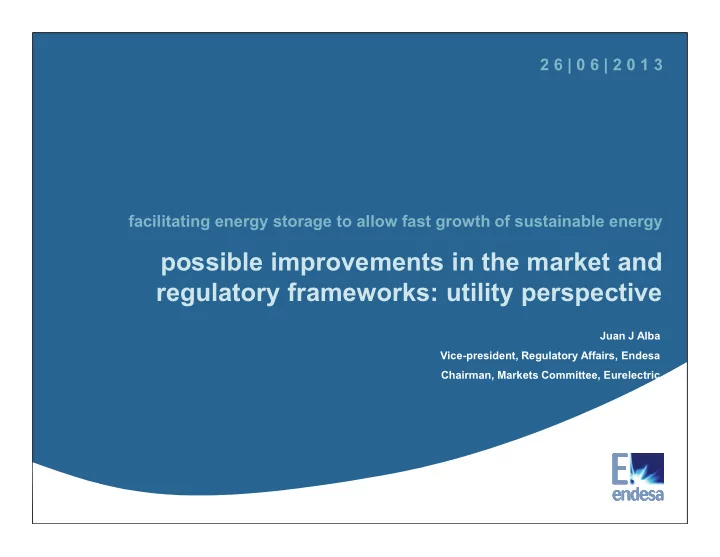

2 6 | 0 6 | 2 0 1 3 facilitating energy storage to allow fast growth of sustainable energy possible improvements in the market and regulatory frameworks: utility perspective Juan J Alba Vice-president, Regulatory Affairs, Endesa Chairman, Markets Committee, Eurelectric
the role of storage Do we need market (or regulatory) arrangements for storage? • Storage is not the product! • The system needs flexibility • Flexibility can be delivered by • generators, • load, • interconnection, • storage • There should be no market for storage, but market for flexibility • The TSO should procure flexibility on behalf of the system, through the markets for ancillary services. But not storage 2
market signals and storage It can be argued that the market is not providing the right • economic signals to build storage But all market signals should be considered: energy price, • balancing, reserves, other ancillary services, transmission congestion management, reactive, etc. Possible response #1 • So what? That means that storage is not needed, there are • more efficient alternatives Possible response #2 • But this can also be a market failure: storage will be needed • (We know best!) Indeed, it can be claimed that the market is not providing the right signal for any investment 3
storage and market design Current market lacks long term signals, specially for • balancing/flexibility Need to complete market integration and implementation of target • model, including for balancing Remove market distortions, caps, etc. • Should we move towards balancing markets with higher mid/long • term component? Should we move to a market of energy + capacity? • Where storage would compete with generation and load • We need a redesign of the market. Not a market for storage 4
regulation and storage Perhaps we should make storage a regulated asset • That would lead to over-investment, crowding out more efficient • alternatives That would lead to market distortion, competing with other • generators That would kill innovation • The misleading analogy with gas storage • Other regulatory problems: grid fees • We should not regulate storage 5
financing and storage The infrastructure package: funding for grids but not pumping • storage But the power system (grids + all other facilities) should be • funded by tariffs We should not provide specific funding for storage (except for research and development) 6
assessing storage TSOs propose a number of criteria for cost-benefit analysis: • Security of supply • Socio-economic welfare • RES integration • Variation in losses • Variation in CO2 emissions • Technical resilience/system safety • Flexibility • But socio-economic welfare, if appropriately measured, should capture them all 7
storage owned by TSO: conflict of interest “ These Multi-criteria and Cost Benefit Analysis is applicable both to storage systems planned by TSOs and both by private promoters, even if a distinction on different roles and operation uses between these two types must be done. In fact the possibility to install storage plants on the transmission network by TSO is strictly connected to improve and preserve system security and guarantee cheapness of network operation without affect internal market mechanisms and influence any market behaviour. ” ENTSO-E Guideline for Cost Benefit Analysis of Grid Development Projects. Draft 12 June 2013 This is misleading. There are no two types of storage. There are no exceptions to the impact on market behaviour 8
storage: an alternative to grid investments? All investments in generation and load can be seen as an • alternative to grid investment, not only storage And none of those investments can be justified by avoiding • transmission investment only This doesn’t justify TSO ownership 9
storage owned by TSO: conflict of interest TSO controls the dispatching of generation • TSO-owned storage would have an unfair advantage • Lots of examples: potential to distort cross-border trade, • investment decisions by other generator, dispatching outcome The Directive is clear on the application of unbundling: the burden • of proof is on those advocating the contrary Legally, there is no doubt that hydro pumping storage is • generation This conflict of interest is unavoidable: only unbundling can solve it 10
Recommend
More recommend